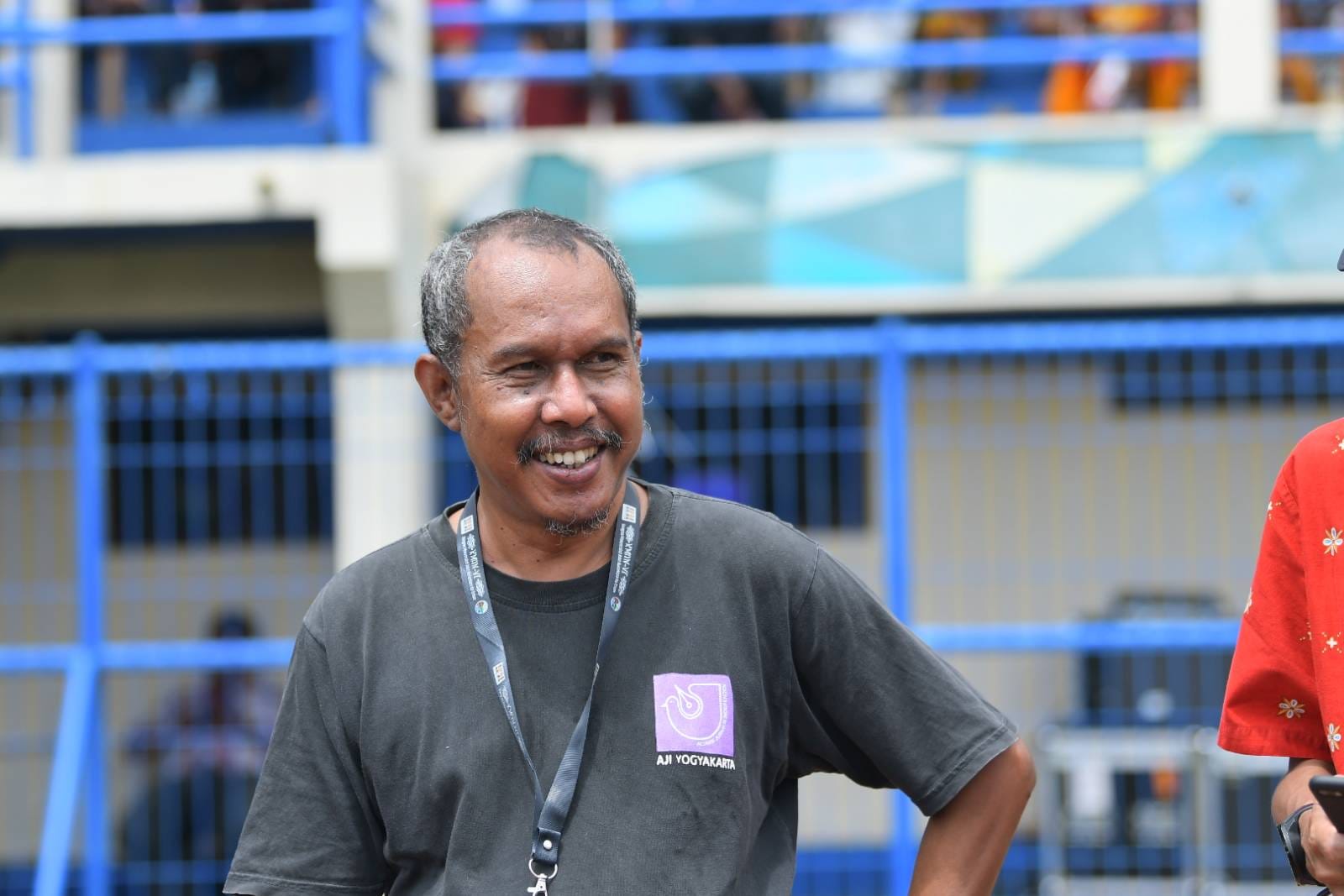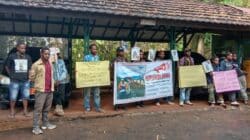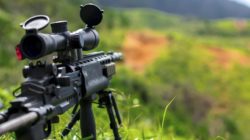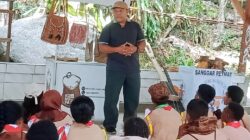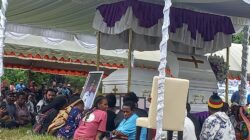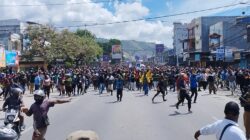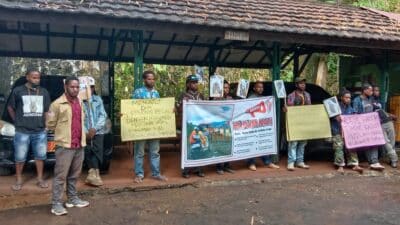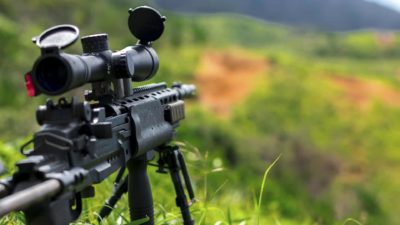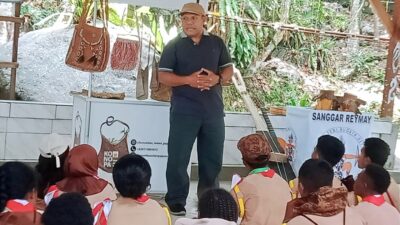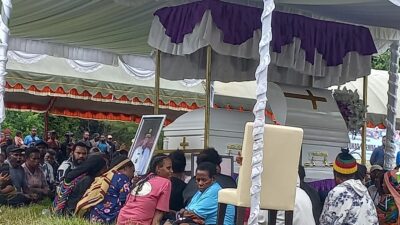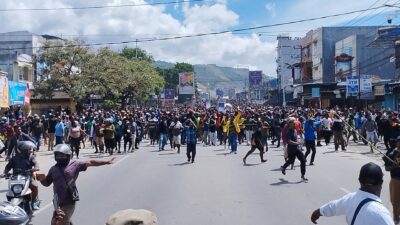Jakarta, Jubi – Victor Mambor, a journalist born in Muara Enim, Sumatra, the chief editor of Papuan newspaper Jubi who often covers discrimination against indigenous Papuans, received the Oktovianus Pogau Award from the Pantau Foundation for courage in journalism.
“Victor Mambor’s decision to return to his father’s homeland and defend the rights of indigenous Papuans through journalism, as well as being steadfast in the face of intimidation after intimidation, made the jury agree that he was a courageous journalist,” said Andreas Harsono from the Pantau Foundation.
Victor Mambor’s name was recently mentioned in the media after a bomb was detonated outside his house on January 23 in Jayapura. Mambor suspected the terror was related with Jubi’s coverage of the murder and mutilation of four indigenous Papuans from Nduga in Timika in October 2022, wherein four soldiers were charged with “premeditated murder”.
Victor Mambor was born in 1974. He is the son of Rachmawati Saibuna and John Simon Mambor, a poet from Rasiey, Wondama Bay and a leader of the Papua Council Presidium, who died as a political prisoner in Jakarta in 2003 at the age of 55. Presidium Chairman Theys Eluay who was killed by Indonesian soldiers in November 2004 in Sentani, Papua, was a colleague of John Mambor.
Victor Mambor grew up in Muara Enim until he graduated from SMAN 1. In 1992, he moved to Bandung, where he later worked as a journalist for Pikiran Rakyat daily. In Bandung, he was mentored by Suyatna Anirun, an actor and director from the Bandung Study Theater Club.
In 2004, after his father died, young Victor Mambor decided to work as a journalist in Jayapura. He was appointed editor of Jubi, later general manager, expanding into television and using drones.
On his blog, Victor Mambor posts important texts he created or translated between 2005 and 2017, including the abduction of Papuan children to Java and his criticism towards Jakarta journalists’ perspectives, which often only talk about Indonesian nationalism and not giving much space for Papua’s perspectives.
In May 2015, Victor Mambor interviewed President Joko Widodo in Merauke about restrictions on foreign journalists entering Papua since 1967. Jokowi replied that all foreign journalists are free to enter Papua without restrictions. Ironically, to this day, President Jokowi’s statement has not come true. Foreign journalists are still restricted from entering Papua.
In 2019, together with several journalists in Pacific island countries, he founded the Melanesian Media Freedom Forum. Mambor has also increased coverage of the Pacific region through Jubi, a natural thing for Papuan media, as well as working with media outlets such as Radio New Zealand, Solomon Star, Vanuatu Daily, Melanesia News, Fiji Times, Islands Business, Cook Islands News, Post Courier, and Marshall Islands Journal.
Victor Mambor was one of three producers of an investigative video entitled “Selling Out West Papua” broadcast by Al Jazeera in June 2020. He collaborated with Mongabay, The Gecko Project and the Korea Center for Investigative Journalism. It was about how a South Korean company, Korindo, seized land and destroyed Papua’s forests. He received the Wincott Award for Video Journalism.
On May 21, 2021, Mambor was intimidated. His car glass was broken, and the door was spray-painted, while parked at night in front of his house in Jayapura. The police have yet to find the perpetrators of this vandalism.
In September 2021, António Guterres, Secretary-General of the United Nations, issued an annual report on international cooperation in the field of human rights. Guterres named Victor Mambor as one of five human rights defenders who frequently experience intimidation, harassment and threats in covering issues in Papua and West Papua provinces.
Yayasan Pantau calls on the Indonesian police, especially in Papua, to keep Victor Mambor safe, and to find the people who damaged his car and placed a bomb in front of his house.
As a person with a Palembang mother and Papuan father, Mambor is both Indonesian and Papuan, and he could see human rights violations and environmental destruction in Papua. Mambor often quotes his father saying, “Be proud of yourselves as Papuans who have never begged on their rich land.”
In Papua, Victor Mambor is also often accused of not defending the non-Papuan people who have come to Papua since the 1960s. However, Mambor once wrote on Facebook, “My mother is Sumatran, my wife is Sumatran, in my workplace there are more non-Papuans than Papuans. We work in harmony, there is no different treatment. Am I racist and discriminatory when I am outspoken about fighting for the rights of Indigenous Papuans?”
Victor Mambor certainly knew the late Oktovianus Pogau. When Pogau died on January 31, 2016, Mambor wrote, “Oktovianus Pogau was not just a friend and brother to me. He was both a partner and a rival to me. He was my ‘left brain’ in journalism. He is ‘half of my soul’ in journalism. He has no equal. He has no match. He opened the eyes of many people to what was really happening in Papua. He deserves to be remembered as a liberation fighter, because he is a legend.”
According to Andreas Harsono, Victor Mambor not only closely knew Oktovianus Pogau but also supported and continued Pogau’s ideals about the responsibility of indigenous Papuan journalists, Indonesian journalists and international journalists to be brave in reporting what is happening in Papua.
About the Pogau Award
The award is named after Oktovianus Pogau, a Papuan journalist and activist born in Sugapa on August 5, 1992. Pogau died at the age of 23 in Jayapura. The award is given annually to commemorate Pogau’s bravery.
In October 2011, Pogau reported on violence against hundreds of indigenous Papuans during the Third Papuan Congress in Jayapura. Three Papuans died and five were jailed on treason charges. Not a single Indonesian official was questioned or punished. Triggered by the condition that not many Indonesian media were reporting these violations, Pogau launched Suara Papua on December 10, 2011.
Pogau is a writer and activist who uses words to discuss and hone his political ideas. This choice has often gotten Pogau into trouble. He was sympathetic to the West Papua National Committee, a Papuan youth organization, which challenged Indonesia’s control of West Papua. He was once a member of this organization while studying at the Indonesian Christian University in Jakarta, but knew he had to maintain his independence.
Pogau also frequently wrote about restrictions on international journalists covering West Papua and helped translate a 2015 Human Rights Watch report, “Something to Hide: Indonesia’s Restrictions on Media Freedom and Human Rights Monitoring in Papua.”
He also protested restrictions on Papuan journalists as well as the use of journalists’ work for spying. He indirectly led President Joko Widodo in May 2015 to ask the Indonesian bureaucracy to stop restrictions on foreign journalists covering West Papua. Unfortunately, Jokowi’s order has not been fully complied with.
His courage in journalism and siding with marginalized people led the Pantau Foundation to recognize Oktovianus Pogau as a model for brave Indonesian journalists covering human rights violations and environmental destruction. The award has been given annually since January 2017.
This year’s Pogau Award jury consists of Andreas Harsono (Jakarta), Alexander Mering (Pontianak, Bogor), Coen Husain Pontoh (New York, Bolaang Mongondow), Made Ali (Pekanbaru), and Yuliana Lantipo (Jayapura). (*)


